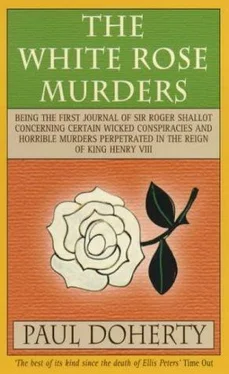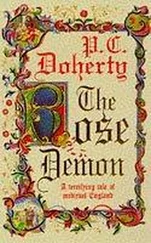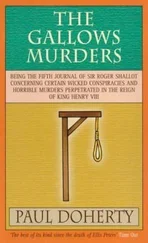Paul Doherty - The White Rose murders
Здесь есть возможность читать онлайн «Paul Doherty - The White Rose murders» весь текст электронной книги совершенно бесплатно (целиком полную версию без сокращений). В некоторых случаях можно слушать аудио, скачать через торрент в формате fb2 и присутствует краткое содержание. Жанр: Исторический детектив, на английском языке. Описание произведения, (предисловие) а так же отзывы посетителей доступны на портале библиотеки ЛибКат.
- Название:The White Rose murders
- Автор:
- Жанр:
- Год:неизвестен
- ISBN:нет данных
- Рейтинг книги:4 / 5. Голосов: 1
-
Избранное:Добавить в избранное
- Отзывы:
-
Ваша оценка:
- 80
- 1
- 2
- 3
- 4
- 5
The White Rose murders: краткое содержание, описание и аннотация
Предлагаем к чтению аннотацию, описание, краткое содержание или предисловие (зависит от того, что написал сам автор книги «The White Rose murders»). Если вы не нашли необходимую информацию о книге — напишите в комментариях, мы постараемся отыскать её.
The White Rose murders — читать онлайн бесплатно полную книгу (весь текст) целиком
Ниже представлен текст книги, разбитый по страницам. Система сохранения места последней прочитанной страницы, позволяет с удобством читать онлайн бесплатно книгу «The White Rose murders», без необходимости каждый раз заново искать на чём Вы остановились. Поставьте закладку, и сможете в любой момент перейти на страницу, на которой закончили чтение.
Интервал:
Закладка:
Chapter 9
I entered Dover at nightfall just as the sky darkened and rain began to beat down on my plumed cap. I stayed in a flea-ridden inn whilst outside the sea began to seethe and boil under a sudden black storm. By dawn the weather had abated though the sea was still angry, its surface broken into dark ridges and furrows by a " treacherously high wind. A sloop took me out to the ship which dipped and rose wildly in the harbour. Oh, God, it looked pitifully small and flimsy! I spent the day riding, or rather bucking, at anchor, the only time in my life I really wanted to die.
The next day the idiot of a captain decided to make a run for the open sea. I gave up. I stayed in the darkness vomiting as the ship veered wildly through the troughs of high waves. I prayed to every saint I knew and, when I reached Harfleur, spent a great deal of my time resting in a seaside tavern. After a few days my condition improved, the weather changed dramatically, and I made my way across the cultivated, fertile fields of Normandy. A week's journey to the Porte of St Denis and into Paris. At first the city entranced me: the spacious meadows and dark green woods near the walls; the windmills, chateaux and palaces being swiftly built in the new Italianate style with their facades of grey stone, high arched windows and elegant columns.
My knowledge of French was rather better than Benjamin knew. I soon found my way around both the broad boulevards and reeking, rat-infested alleyways. Now Paris is a city which seethes like a hissing snake.
It is full of intrigue, subtle plots, and traders who could cheat a beggar out of his skin. My store of money began to dwindle but at last I found Le Coq d'Or, a dingy, two-storey building which stood at the mouth of one of the runnels on the far side of the Grand Pont opposite the elaborately carved Notre Dame Cathedral.
The landlord was a snot-nosed, weak-eyed character with greasy, spiked hair and a face as pitted as the track which ran past his dingy tavern. I took a garret there, posing as an English student from the halls of Cambridge. It was the sort of place where you are accepted for what you claim to be, your worth depending on how much gold or silver you have in your purse. After two or three days I bought the landlord a carafe of his own wine – the mean-mouthed varlet picked a costly, unsealed jar, not the usual watery vinegar he served most of his customers – and asked him about Selkirk. The fellow gave me a world-weary look and shook his head.
'I cannot remember everybody, Monsieur.' A piece of silver jogged his memory. 'Ah, yes,' he answered, breathing wine fumes into my face. 'The Scottish doctor – thin as a beanpole with untidy red hair. He and his stupid verses!' The fellow shrugged. 'He was here for a while. But then other Goddams [This is what the French used to call us English] came and took him away.'
'What did Selkirk do?' I asked. 'I mean, before his arrest.'
The landlord made a face. 'He stayed in his room, he went out.. .'
I fidgeted angrily and the fellow licked his lips.
'I think he went to St Denis,' he continued. 'To the abbey there. Or to Notre Dame.' He brought a dirty finger up to his lips. 'He was always carrying a casket, a battered, tattered thing which he guarded with his life.'
'What was it?'
'I don't know.'
'The English who came for him, did they find the casket?'
'No, I don't think so. They ransacked his room and were angry because they couldn't find anything. Selkirk laughed at them, jumping up and down here in the taproom. Some of the things he said made no sense so they gave him a crack across the head and took him away. That was the last I saw of him.'
I could make no further headway with the landlord so I made enquiries amongst the other customers: a beggar who whined for alms inside the doorway and a greasy-haired knave, but they only repeated what the landlord had said. The only clue (and one I ignored at the time), was Selkirk's interest in the Abbey of St Denis to the north of the city. I was planning to go there when my descent into the horrors began.
Now, Moodie had given me a package. Of course, I had opened it and found nothing more than a piece of costly silk, blood-red and fringed at each end. A sort of sash for some lady to wear round her smooth, soft-skinned waist. It gave off a fragrant smell which stirred my memory though I could not place it. Anyway, bored by my stay at Le Coq d'Or I decided to go to the shop under the Sign of the Pestle in the Rue des Moines and leave Moodie's present there.
[Yes, yes, my little chaplain is correct. He has pursed his sour lips and guessed my true intentions: if I had not been so bored, I would have sold it. I wish to God I had!]
I found the Rue des Moines and entered the small apothecary's shop, but I was disappointed. There was no Madame Eglantine, only a garrulous old man who chattered like a magpie, took the package and said he would hand it over to the lady next time she visited the place. I told him who I was and where I was staying and then forgot the whole incident. Two days later I was in the taproom of Le Coq d'Or, the slattern beside me half drunk. She pressed up against me, her fingers tickling my codpiece though I knew she was after my purse. My hand was teasing her juicy shoulders and succulent breasts thrust out from a dirty, though very low-cut bodice. A call of nature interrupted my pleasure and I went out to the necessary house behind the tavern, nothing more than a hole in the ground enclosed by a shabby wooden palisade and a door which bolted from the inside. I was squatting there, contemplating my future, when suddenly the door burst open. Three figures, their faces muffled by cloaks and broad-brimmed hats, seized me and began to beat me as if I was some dog.
Now in life there is nothing more defenceless or ridiculous than a man with his pantaloons about his ankles, his shirt tail raised and his mind on other matters. The three ruffians pummelled me, banging my head against the wooden slats. Of course, I fought back like a veritable lion but my sword and dagger were in the garret and who in the tavern would listen to my screams?
Within a few minutes my body was one mass of bruises from head to toe. Two of the ruffians seized me, pushing me against the fence, and I could only gabble in horror as their leader drew a long, thin stiletto and pulled back my shirt to expose my throat. He said something in French about the shop and the Sign of the Pestle. I saw the evil light in his eyes and knew that so far they had only been playing with me: their real intent was to kill. I gave one more scream, I don't know for whom. Benjamin! My mother! My nurse! Wolsey! Anyone! The dagger moved closer, nicking part of my neck just under my left ear.
'I'm too young to die!' I screamed.
[I can see that little bastard of a chaplain laughing again. Does he think it's funny? Look, I'm no hero and, if you had your pants down and three ruffians bent on killing you, you'd bloody scream!]
I closed my eyes and suddenly the jakes door was thrust back and a veritable mountain of a man stood there. He roared in French at my three assailants, brandishing a huge club. They took one look at him and scampered over the fence as quickly as rats over the timbers of a sinking ship. I just slumped and sat down in the mud and dirt.
The Colossus squatted down next to me. I glimpsed a broad, cheery face, a bristling beard and moustache.
'Who are you?' I whispered.
The fellow stood up and I saw the long, brown gown of a Franciscan monk, the rough cord round his waist and the wooden crucifix slung on a piece of string round his neck.
'I am Brother Joachim,' he announced in a voice like thunder.
'You are a priest?'
'I am a Franciscan and a Maillotin.'
'A Franciscan I know. What's a Maillotin?' I mumbled through bloodied lips.
Читать дальшеИнтервал:
Закладка:
Похожие книги на «The White Rose murders»
Представляем Вашему вниманию похожие книги на «The White Rose murders» списком для выбора. Мы отобрали схожую по названию и смыслу литературу в надежде предоставить читателям больше вариантов отыскать новые, интересные, ещё непрочитанные произведения.
Обсуждение, отзывы о книге «The White Rose murders» и просто собственные мнения читателей. Оставьте ваши комментарии, напишите, что Вы думаете о произведении, его смысле или главных героях. Укажите что конкретно понравилось, а что нет, и почему Вы так считаете.












